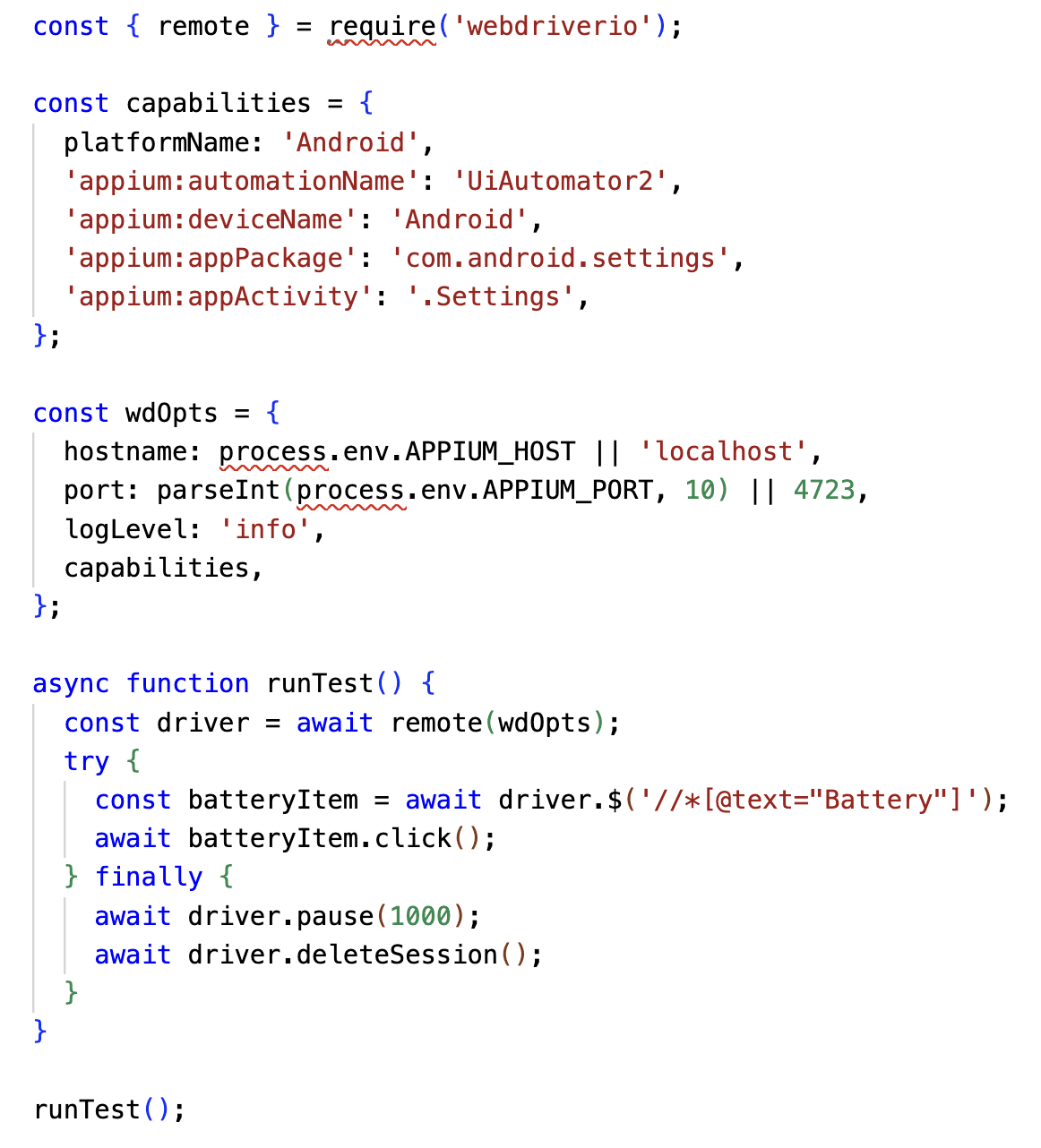Best Alternatives to Appium for Cross-Platform Mobile Testing in 2024
Jun 4, 2024

Fed up with Appium? Wondering what’s best for mobile app testing that works on iOS and Android? This article explores what’s wrong with Appium and which alternatives you should consider in 2024.
What is Appium?
Initially released in 2011 by Dan Cuellar and open-sourced in 2012, Appium is a popular end-to-end testing framework. It has over 16k stars on GitHub.
Appium allows you to use JavaScript, Python, Java or Ruby to create a script representing user flows inside your iOS or Android application.
Appium uses traditional “black box” methods, meaning no app code changes are strictly required to use it.

What are the problems with Appium?
Although well-established in the community, Appium has failed to keep pace with advances in the mobile app ecosystem.
Common complaints about Appium:
It takes a long time to setup
Configuration and server architecture are complex
You need to configure your test execution environment
Test execution time is prolonged, with Appium taking much longer than OS-specific options such XCUITest and UIAutomator
Hard to use for non-technical team members
Is there a future for Appium?
Despite performance issues, Appium has high adoption among enterprise cloud test runners such as Testlio and BitBar. Partly this is due to vast quantities of existing Appium scripts existing for legacy apps. Additionally, many large enterprises have invested significantly in on-premise Appium infrastructure which has not yet reached end-of-life.
However, the shift away from Appium to modern alternatives is well underway in startups and app development agencies with larger firms beginning to follow. If you're building an automated app testing suite from scratch then avoid Appium if possible by testing out the option below.
Best for startups and agencies: Moropo
Moropo is an end-to-end UI testing service for iOS and Android apps focusing on speed and usability. Using an innovative Test Creator which switches between no-code and scripted mode, Moropo suits teams where not everyone is an engineer, such as busy digital agencies and “all hands on deck” startups. Moropo has first-class support for open-source Maestro scripting so there's no vendor lock-in, unlike other commercial tools on the market.
Moropo is a relatively new tool. This does mean it takes advantage of the latest technological advances; however, there is also less maturity in the product compared with other offerings.
What are the pros of using Moropo for mobile testing?
Simple UI suitable for non-technical team members and dev alike.
Entirely based in the cloud, meaning no requirement for any local installation or "works on my machine" divergence.
Fully integrated iOS simulator and Android emulator virtual device farn.
Ability to trigger test runs via a schedule, manually or through CI/CD integration.
Import and export tests using open-source Maestro format.
More cost-effective than enterprise options.
What are the cons of using Moropo for mobile testing?
No support for real device.
Not as feature-rich as enterprise offerings such as Waldo.
Conclusion
Moropo joins the dots effectively between commercial quality-of-life features and an open-source ethos. A focus on accessibility for non-developers and QA collaboration make it a good match for small to mid-sized teams. Enterprise users may be frustrated with the lack of product maturity.
Best for large enterprises: Waldo
Founded in 2018, Waldo is the oldest alternative in our comparison. Those extra years have allowed the Waldo team to hone a stable and beautiful product and add many enterprise features.
Bigger-budget enterprise teams will likely benefit from Waldo’s cloud infrastructure which supports SSO and custom service-level agreements for mission-critical apps. But with a typical plan costing $36,000 per year, Waldo is too expensive for smaller teams.
As Waldo’s scripts are closed-source, you won’t be able to add them to your in-house repositories or even view them as Waldo is completely no-code. However, they have a “branches” feature mimicking GitHub-style functionality to help organise your test flows.
Waldo was initially built for just iOS, with Android added later. The offshoot is that test flows must be recorded separately for iOS and Android. For mobile apps with feature parity across both platforms, you’ll need to record each flow twice.
What are the pros of using Waldo for mobile testing?
Sophisticated features such as test version management.
Fun branding and marketing website.
Responsive support team.
Expansive documentation.
Mature and stable product.
What are the cons of using Waldo for mobile testing?
Expensive for the automation plan.
Need to talk to sales to get access to pricing.
You need separate tests for iOS and Android.
No support for real devices.
No open-source import or export.
Conclusion
Waldo is worth considering if you’re a large enterprise with lots of iOS and Android-specific functionality. Given the high price for their automation plan, Waldo makes less sense for agencies and startups.
Best for solo developers: Maestro Studio
Maestro Studio is an open-source tool from the team at mobile.dev. With a focus on developer-first support, Maestro Studio runs locally and uses your XCode Simulator or Android Studio Emulator to do the heavy lifting.
This tool works well for solo developers working on hobby projects and smaller apps where simple flow validation is all that is required. The added benefit is it’s free and open source, with community support available via their Slack group.
Maestro Studio requires a command line interface installation, so the tool is unsuitable for non-developers. If you want your UX designer or Product Manager to contribute to test flows, then it’s worth looking at Moropo or Waldo instead.
As it’s a community-focused product, there are no paid support plans for Maestro. Larger organisations or teams managing mission-critical mobile apps may want to look at other options if a dedicated issue resolution or service level agreement is required.
What are the pros of using Maestro Studio for mobile testing?
Open-source and free
Intuitive declarative script format
Cross-platform for iOS and Android
Maestro Studio scripts can be imported into Moropo
What are the cons of using Maestro Studio for mobile testing?
Technical command-line interface installation
Environment differences between local authoring and cloud execution mean tests can be flaky
Sparse tooling when it comes to results inspection
Can’t test iOS without a Mac
Conclusion
Maestro Studio is perfect for solo developers and hobby projects. Still, it fails to offer accessibility and results inspection for growing teams. The open-source approach is refreshing, and the community is excited to see how this library progresses over the coming months and years.
FAQ
What’s the best alternative to Appium in 2024?
For startups and agencies, Moropo is the best replacement for Appium. Moropo combines robust end-to-end testing automation with a user-friendly UI. Other alternatives include Waldo and Maestro Studio.
Do people still use Appium for mobile testing?
Yes, absolutely. There are plenty of Appium scripts still in use across the mobile testing ecosystem. However, many teams are considering or actively pursuing a migration to more modern methods such as Moropo. If you’re working from a greenfield testing setup, investigate alternatives before adopting Appium.
